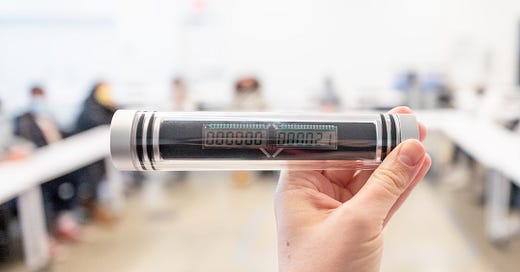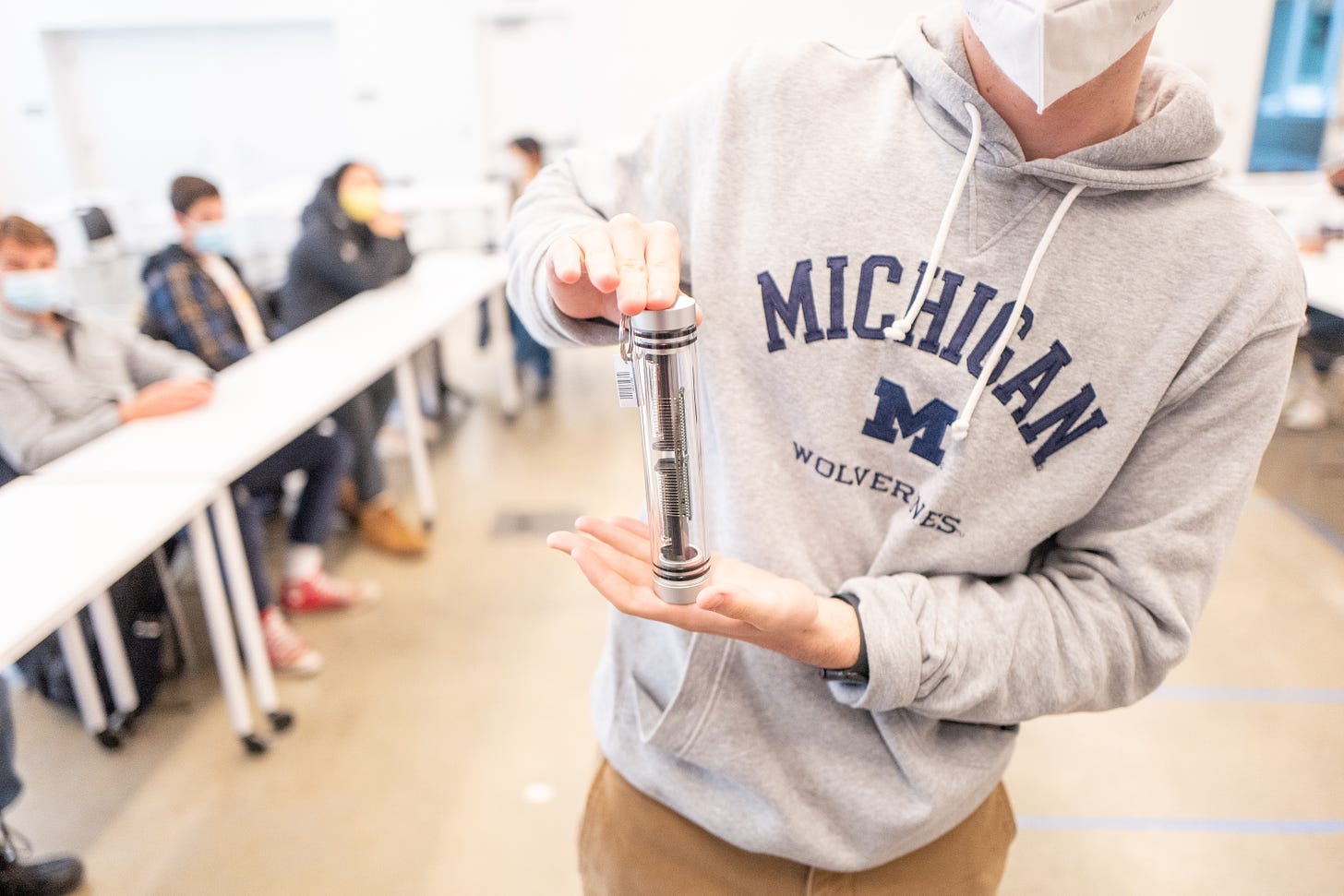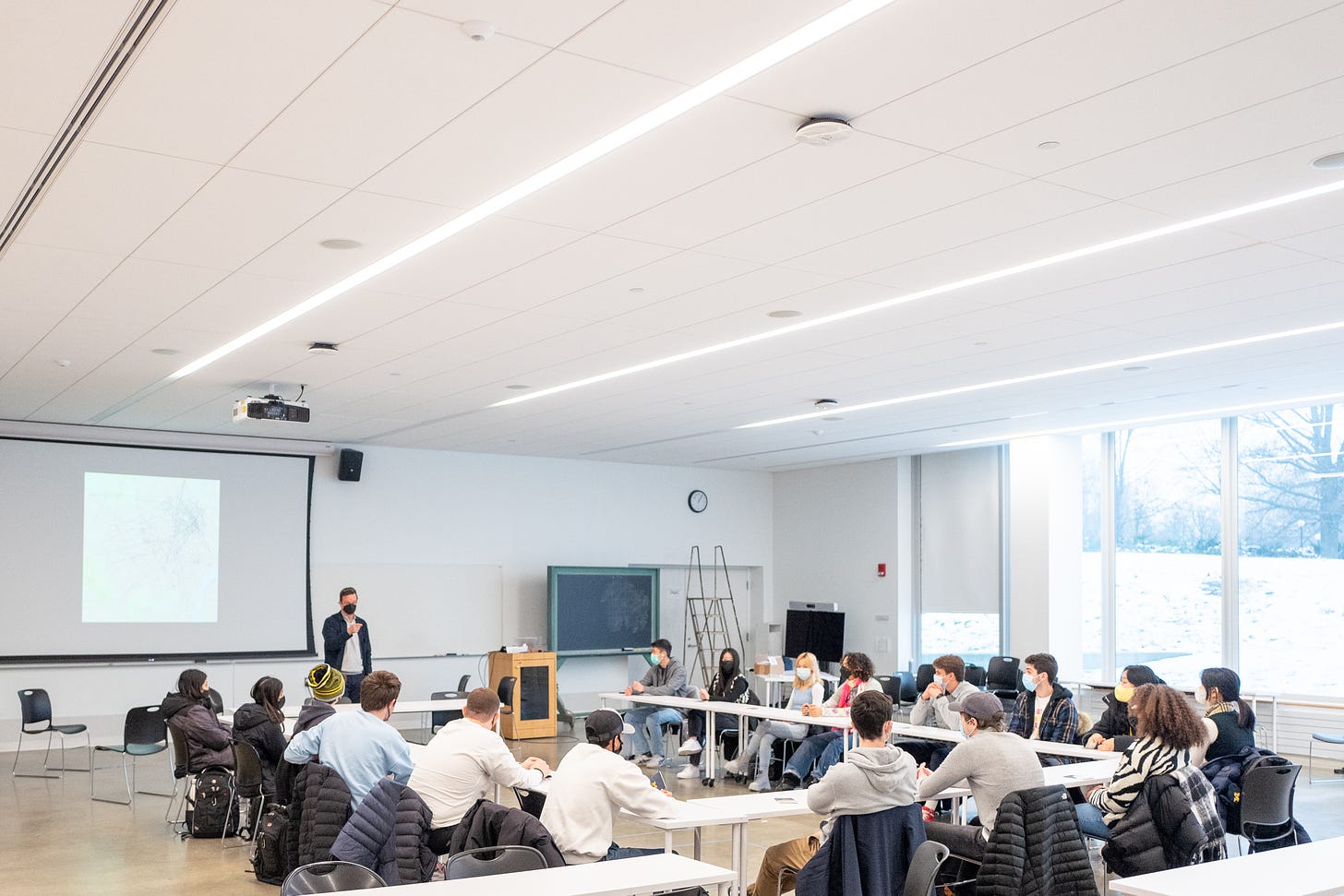Every issue of the newsletter has been terminated with a little running person emoji 🏃 to symbolize the feeling of creating this new program from scratch. Seventy-six weeks ago we started this newsletter, and many weeks before that the College began articulating the Urban Technology degree program. That little person has been running by themselves for two years and change. No longer!
As of this week, we’ve been joined by ~20 students and the semester has begun. A little about that and an update on our Prototype Grant program below.
💬 Hello! This is the newsletter of the Urban Technology program at University of Michigan, in which we explore the ways that technology can be harnessed to nurture and improve urban life. If you’re new here, try this 90 second video introduction to our degree program.
Since it’s also college application season for high school students and the ones who love them, here’s a good way to learn more about our degree program.
🎆 All Systems Go
Launching a new degree program entails meetings aplenty, documents galore, and planning a-go-go. After all of that, day one sneaks up on you. There’s no delaying and no soft launch. Academic calendars are published in advance and are nearly as immutable as a cryptographic ledger. With the quiet sweep of the minute hand on a Wednesday afternoon the clock moves from 12:59 to 1:00pm, and the program becomes a real thing. Did the universe notice?
Organizations, including academic programs like ours, are nothing without a record, and so we took a few minutes out of day one (thanks, Malcolm) to inscribe this shared moment in our own minds by starting a very special clock. The Time Since Launch clock is designed to count for some thousands of years (!) from the moment that a pin is pulled out of the side. The time on this clock’s display is a shared reference point for all of us in the room.
Charlie put everyone’s names into a cup and drew one at random. Matt’s name was drawn and he was invited to pull the pin on the clock. After a countdown with tabletop drumroll, the pin was pulled, the clock begun, and our timeline inscribed in the universe. Congratulations to our inaugural students.
⚙️ Prototype Grant Winners
Back in October, 2021 we launched a call for applications to our Prototype Grants, an experimental program designed to support work at the intersection of cities and technology. Reviewing the applications was a lot of fun and quite inspiring, as the jury commented during our discussion.
And what a jury it was! Joshua Edmonds, Director of Digital Inclusion, City of Detroit; Gabriella Gómez-Mont, Founder and Director of Experimentalista; Roy Liu, Managing Director and Co-founder Hercules Capital, Inc.; and Michelle Ha Tucker, Head of Design, Sidewalk Labs all got together on a December morning to select the winning projects. Though there were many more that deserved support, we were able to award just three grants, so it was a tough choice indeed.
The winning projects will have the semester to develop their projects, working alongside a Taubman College faculty mentor. The winners are:
JustAir - Darren Riley
Taubman College Faculty Mentor: Joe Grengs, Professor of Urban and Regional Planning
JustAir is a neighborhood level air quality monitoring dashboard. Riley will build a new tool that uses computer vision to track idling trucks waiting to cross the bridge from Detroit to Canada. The idling of trucks produces massive pollution in southwest Detroit and is a ticketable offense that is not enforced by the city. “While JustAir has successfully implemented our local monitoring technology, we are keen on responding to the community's needs of which we serve,” said Riley. “For example, after speaking with environmental justice organizations in the state, there has been a consistent theme around diesel truck idling in communities. After volunteering with environmental justice groups on truck tracking initiatives, where we manually count trucks and videotape any idling events, I was inspired by an opportunity to automate this tracking process that could ultimately support the gaps in the anti-idling ordinance.”
Fides - Daan van der Zwaag
Faculty Mentor: Anthony Vanky, Assistant Professor of Urban and Regional Planning
Fides is envisioned as a Blockchain-based app to enable individuals to own and control their own geolocation data and get paid when apps, companies, or third parties want to utilize it. “I believe equitable data is the necessary step in reaching Web 3.0. Furthermore, earning a few bucks every day instead of nothing can impact communities on a global scale,” said van der Zwaag. “I believe large-scale social justice can work if there is an incentive for everyone, not just the underrepresented, and if together we can work on a better solution than before. I hope to take a deep dive into the hidden layers of future urban technologies and learn along the way. By having a testable prototype, emerging technologies become tangible. Eventually, I hope that millions of people will have Fides to own and monetize their data in a couple of years, and the companies buying the data will follow.”
Tiny Town - Kay Liang and Maria Gerdyman
Faculty Mentor: Ana Paula Pimentel Walker, Assistant Professor of Urban and Regional Planning
Tiny Town is an online, interactive game to encourage interactive and intergenerational storytelling about cities. The goal is to get kids involved in designing and imagining their dream cities. “This project is important to us because we want to help build cities where people can belong and thrive,” said Liang and Gerdyman. “Both of us were deeply shaped by the cities we grew up in and witnessed how their rapid growth has left so many behind. The urban educators and organizers that we met along the way have inspired us to thoughtfully design experiences for people to connect with each other and the places they call home. This grant will not only fund our programming and make it free and accessible to our participants, it will also provide us with the resources and mentorship to develop Tiny Town into an urban technology that can shape the cities we care about.”
We’ll include some updates from time to time in future newsletters.
Links
🏠 Autonomous houses? I wish, but how about a team of 20 horses moving a wooden building?
⛽️ Electric vehicles are cool, but you know what’s cooler? Not having to drive. As cities move to support electric vehicles they should be weary of locking us into a car dependent future, writes Christine Berthet in STREETSBLOG.
🗺 A pleasing diagram of the US electrical grid.
💧 California will digitize its dizzyingly complex water rights. Sounds like a job for urban technology students.
🏞 CityDAO is distributing property parcels via a land raffle.
These weeks: Winter holiday break. Start of the semester. Omicron. Admissions for year two. Closing in on final plans for Spring semester. 🏃🏃🏃🏃🏃🏃🏃🏃🏃🏃🏃🏃🏃🏃🏃🏃🏃🏃🏃





